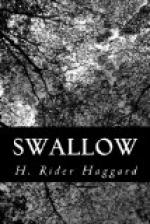The Boers in the laager were awake at last, the sound of the gun and the war-cry of the Zulus had reached them faintly. Half-clad, men and women together, they stood upon their waggon-boxes looking towards the west. Behind them the pencils of daylight were creeping across the sky, and presently in their low rays they saw such a sight as they would never see again. Fast, fast towards them thundered a great roan horse, blood dripping from his chest, and jaws, and flank, and on its back a yellow-bearded man, in whose shoulder stood a spear, and who held in front of him a fainting woman.
“Soon he will fall suddenly, and we shall be crushed,” thought Ralph, and had the horse died while travelling at that speed it must have been so. But he did not. When within fifty yards of the laager suddenly he began to lurch and roll in his stride; then with three bounds he stopped, and standing still, looked round with piteous blood-shot eyes, and whinnied faintly as though he heard some voice that he knew and loved.
Ralph slipped from his back, dragging Suzanne after him, and watched.
For a moment the schimmel stood, his head touching the ground, till presently a bloody foam came upon his mouth, and blood poured from his eyes and ears. Now for the last time he arched his neck and shook his mane, then roaring straight up on his hind legs as he had done when he beat down the Zulus, he pawed the air with his fore feet and fell over upon his back to move no more.
Suzanne had fainted, and Ralph carried her to the camp. There they drew out the spear from his shoulder and tended them both, though beyond gasping the words “Prepare, for the Zulus are upon you,” it was long before either of them could speak.
Yes, yes, they beat off the impi with the loss of only one man, but Ralph took no part in that fight. Indeed, when we joined them four days later, for after burying Sihamba Jan and I trekked round through the waggon pass, by the mercy of Heaven escaping the Zulus, they still lay prostrate on a cartel, clasping each other’s hands and smiling, but speaking little. The Boers, being warned and awake, beat off the Zulus with great loss to Dingaan, for they had the waggons in front, the koppie behind, and the river to one side.
But there were many on that dreadful night whom no schimmel galloped to warn. Ah! God, six hundred of them, men and women, maids and children, and little babies at the breast, went down beneath the Zulu assegai in that red dawn. Six hundred of them slaughtered!
Is not the name of the land Weenen—“The Land of Weeping”—to this day?
We avenged them at the battle of the Blood River indeed; but could vengeance give us back their lives which it had pleased the Lord to take thus fearfully?




